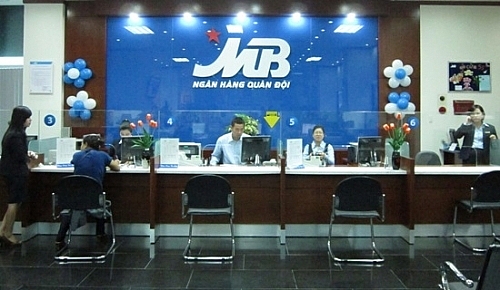Banks raise charter capital on own power for Basel II
 |
| SBV has just approved to raise MBBank's charter capital by 19 per cent |
2017 business results showed huge profit at most Vietnamese banks. However, the overly fast growth of total assets has elevated risks.
According to the National Financial Supervisory Commission, risk weighted assets increased by 9.3 per cent, while the owners’ equity by only 4.6 per cent.
This difference will decrease the capital adequacy ratio (CAR), which in 2017 was estimated at 11.1 per cent, already lower than the 11.6 per cent of the previous year. It continued decreasing during early 2018, according to the National Financial Supervisory Commission. If calculating CAR on the basis of Basel II norms, it will reduce a little more.
Therefore, several Vietnamese commercial banks are using retained earnings to raise their charter capital as the deadline for applying Basel II norms draws near. In late 2017, numerous banks increased charter capital successfully, such as Military Commercial Joint Stock Bank (MBBank) raising it by VND1 trillion ($44 million), Vietnam Prosperity Joint Stock Commercial Bank (VPBank) by VND1.647 trillion ($72.6 million), and Asia Commercial Joint Stock Bank (ACB) by VND1.882 trillion ($83 million).
The capital increasing plans of banks have been highlighted at this year’s annual general shareholders’ meetings. At the end of May, VPBank and MBBank received the State Bank of Vietnam’s approval to raise their charter capital. VPBank could raise it to VND25.299 trillion ($1.11 billion) from the current VND15.7 trillion ($690 million). MBBank was allowed to raise its charter capital to around VND21.6 trillion ($950 million) from VND18.2 trillion ($800 million).
The two banks plan to raise equity by issuing shares to sell to foreign and domestic investors and pay dividends, and by issuing bonus shares from their retained earnings and reserves. Resources for the increase mainly come from the banks’ owners’ equity. Thus, although VPBank raises charter capital by a significant margin, total owners’ equity did not change much and CAR will not improve.
These are not the only banks resorting to the use of retained earnings to raise capital from owners’ equity.
Shortly after its market debut on June 4, Techcombank announced that it would hold an extraordinary meeting to seek shareholders’ approval to increase its capital to VND35 trillion ($1.5 billion) from VND11.7 trillion ($515 million).
Earlier this year, Saigon Hanoi Commercial Joint Stock Bank (SHB) issued nearly 84 million shares to pay dividends to its shareholders and raised its capital by VND900 billion ($40 million) to VND12 trillion ($527 million). It is seeking to increase its charter capital to more than VND13.2 trillion ($580 million) by the end of this year.
Hiking capital aims to lure investment from foreign and domestic investors, as well as raise banks’ owners’ equity. However, not many banks managed in this.
Last year, Vietcombank negotiated to sell 7.7 per cent to Singapore’s investment fund (GIC) to gain $400 million, but the deal has yet to be conducted. Similarly, BIDV considered signing an agreement with a South Korean financial corporation but the deal has yet to be announced.
While CAR has not been raised, banks are facing the risk of diluting shares if they raise equity or pay dividend by issuing bonus shares.
Another reason is that the banking sector has gone through a rough patch a few years ago. Its poor business performance together with the high level of non-performing loans has dragged down banking stocks, making shareholders more cautious about investing in them.
In this situation, using cumulative earnings to raise charter capital is a more likely choice. Bank owners prefer this as their cash is kept at the banks and is on hand for other investments.
Between late 2017 and the end of the first quarter of 2018, the stock market grew well, especially bank stocks. Thereby, banks caught this opportunity to plan issuing shares. However, in the second quarter, the stock market has become bleaker, and numerous banking stocks dropped, so investors should consider twice before pouring money into these stocks.
What the stars mean:
★ Poor ★ ★ Promising ★★★ Good ★★★★ Very good ★★★★★ Exceptional
Related Contents
Latest News
More News
- NAB Innovation Centre underscores Vietnam’s appeal for tech investment (January 30, 2026 | 11:16)
- Vietnam moves towards market-based fuel management with E10 rollout (January 30, 2026 | 11:10)
- Vietnam startup funding enters a period of capital reset (January 30, 2026 | 11:06)
- Vietnam strengthens public debt management with World Bank and IMF (January 30, 2026 | 11:00)
- PM inspects APEC 2027 project progress in An Giang province (January 29, 2026 | 09:00)
- Vietnam among the world’s top 15 trading nations (January 28, 2026 | 17:12)
- Vietnam accelerates preparations for arbitration centre linked to new financial hub (January 28, 2026 | 17:09)
- Vietnam's IPO market on recovery trajectory (January 28, 2026 | 17:04)
- Digital economy takes centre stage in Vietnam’s new growth model (January 28, 2026 | 11:43)
- EU Council president to visit Vietnam amid partnership upgrade (January 28, 2026 | 11:00)

 Tag:
Tag:

























 Mobile Version
Mobile Version